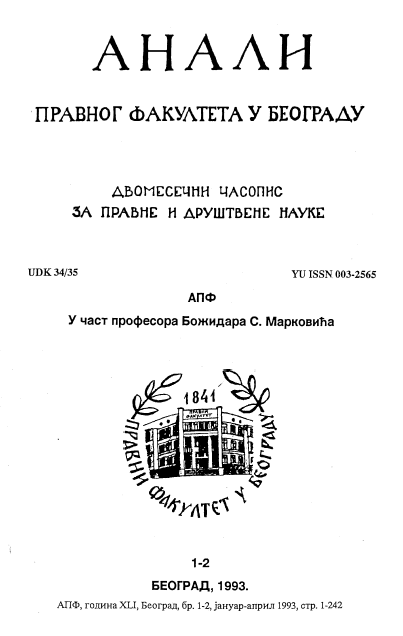БЕОГРАДСКА ЦИВИЛИСТИКА И ЊЕНО ЕВРОПСКО ОКРУЖЕЊЕ (Школе и правци y првом веку српске цивилистике)
BELGRADE CIVIL LAW THEORУ AND EUROPEAN ENVIRONMENT (Schools of thought and conceptions in the first century of Serbian civil law theory)
Author(s): Vladimir V. VodinelićSubject(s): History of Law, Civil Law
Published by: Правни факултет Универзитета у Београду
Keywords: Schools in the sphere of law; Civil law theory and system; Serbian and European school of thoughts; XIX and XX centuries
Summary/Abstract: The first century of Serbian civil law (end of 4th decade of XIX and the beginning of 5th decade of the XX century) is characterized by five continuities: (i) most important civil law theoreticians have always been professors of the Belgrade law school with universal approach to the matter, (ii) actived in several fields of civil law, (iii) dedicated to the general theory of law and legal philosophy, (iv) activity in other branches of social sciences; (v) connected with great legal theories of the world. This connection is specially elaborated in the present article. At the time of first engagement of Serbian civil law system experts, this branch has been stell developed in other countries as national civil law theories. German, French and Austrian theories have exerted considerable influence on Belgrade school, both in the sphere of dogmatics and in general theory. Every civil law theoretician here is recognizable by his close connection with foreign theory ("French connection", etc.). All schools which had their representatives in those three countries (ius-naturalism, exegetics, statutory positivism, historical school of law, pandects, notion-wise jurisprudence, free theoretical research of law, the movement of free law, interest and value jurisprudence) have found them here, too. The same applies to followers of Kant and Hegel, while marxism has been rejected in a way. However, due to small number of our analysts of civil law theory which were active in general theory of law and legal philosophy, we had no school in traditional way, but rather conceptions of a few. Even the exegetics conception, in spite of the 1844 codification of civil law was not formed as a school. Closest to such was, at least the ius-naturalism (whose peak was about the eighties of the XIX century), historical legal school (at the end of the century) and sociological tradition of Ihering and Gény (in the XX century). Otherwise, dominant were the eclecticism, due to which there were abundance of ideas. The Belgrade system of civil law theory is most original in verification, criticism and departure from some of the concepts of European legal schools and ruling opinions.
Journal: Анали Правног факултета у Београду
- Issue Year: 41/1993
- Issue No: 1-2
- Page Range: 59-74
- Page Count: 16
- Language: Serbian

